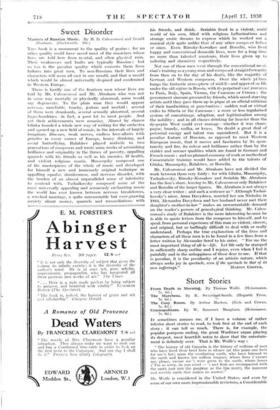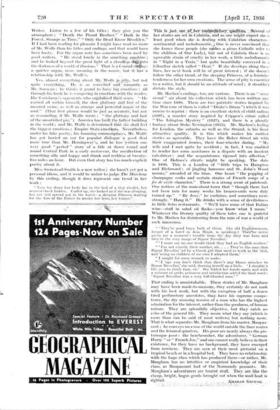Short Stories
From Death to Morning. By Thomas Wolfe. (Heinemann. 7s. 6d.)
The Marchesa. By K. Swineit-Smith. (Hogarth Press. 7s. 6d.)
The Cosy Room. By Arthur Machen. (Rich and Cowan. 7s. 6d.) Cosmopolitans. By W. Somerset Maugham. (Heinemann. 7s. 6d.)
IT sometimes amuses me, if I have a volume of rather inferior short stories to read, to look first at the end of each story ; it can tell so much. • There is, for example, the popular pompous ending, the great Wurlitzer organ playing its deepest, most heartfelt notes to show that the entertain- ment is definitely over. That is Mr. Wolfe's way :
" The history of old Catawba is the history of millions of men who have lived their brief lives in silence (at this point one feels for one's hat) upon the everlasting earth, who have listened to the earth and known her million tongues, whose lives (' excuse me, please, excuse me ') were given to the earth, whose bones (" I'm so sorry, do you mind — ') and flesh are recompaeted with the earth (out into the gangway as the lips meet), the immense mid terrible earth that makes no answer."
Mr. Wolfe is considered in the United States, and even by some of our own more impressionable reviewers, a Considerable . - . Writer. Listen to a few of his titles ; they give you the atmosphere : " Death the Proud Brother," " Dark in the Forest, Strange as Time," " Only the Dead Know Brooklyn." If I had been reading for pleasure I might have read no more of Mr. Wolfe than his titles and endings, and that would have been hasty. For the organ note has sometimes been used by good writers. " He "stoed lonely in the searching sunshine ; and he looked beyond the great light of a cloudieo riSistinto the darkness of a world.of illusions." That is a Conrad eiltbng : a quieter :organ, more meaning in the -music, but -it: has-a
relationshipp ;Wit h Mr. Wolfe's. _ .
Yes, almost everything about Mr...Wolfe krt.411y, but not quite everything. He • is as conceited and romantic as Mr. Saroyan : he thinks it grand to have big. emotions : all through his book he is competing in emotions with 'the reader, like Coriolanus's opponents who caf)lialied their scars. " He carried all within himself, the sloW- gluttony arid lest of the- unsated swine, as well as strange and powerful' music' of the soul." (That first phrase would be' just as accurate, but net; so resounding, if Mr. ‘Volfe wrote : " the-gluttony and lust of the unsatisfied-pig.") America has built.the tallest building in the world ; and Mr. Wolfe is determined th'at she Shall feel the biggest. emotions Empire State-.4Mitons. Nevertheless:- under his fake poetry, his booming commo4ltees, Mr. Wolfe has got buried an car for popular dialogue a good deal more true than Mr. Hemingway's,. and he has Written one very good ." period " story of a ride at dawn round, and round Central Park in a early motor-car, the recollection' of something silly and happy and drunk and reckless at twenty- five miles an hour. But even that story hai too much explicit poetry about it.
' - - • --
Miss Swinstead-Smith is a new writer;' Sheluisn't. yet got a personal idiom, and it would be unfair to judge Tice Marchem
by this ending, though it does represent one trend in her work :
" Very far down her hods lay in the bed of a tiny rivulet, her scarred cheek hidden. Curled up, shelooked.as if she was sleeping,- her net veil spread out in the water—a sleeping Princess waiting for the kiss'bf the Prinee to awake her Qom her trance.": This "is just..e- LAther.. 71ciftlifitittini..-_,:- *Viral of her stories are set in Calabria, and as one might expect she is least good when she is dealing with Calabrian characters : sentimental and melodramatic.) One is never convinced that she knows these people (she inklies a pious Catholic refer to the children of Our Lady), bist out of Calabria there" is au agreeable strain of cruelty in her work, a little melodramatic in " Night in a Train,"; but quite beautifully conveyed in a ;Gibraltar sketch called " Heat" If she develops along these lines, her next book will be of great interest ; if she doesn't follow the other trend, of the sleeping Princess, of a feminine tenderness for her own creations. The sense of pity is essential 'to a writer, but it should be an attitude of mind ; it shouldn't dictate the style.
Mr. Machen's endings, too, are various. There. is an " occa- sional " air about his collection which has been written any time since 1890. There are two patriotic stories inspired by the War (one of them is called "Drake's Drum") which it .Was unwise to reprint : there is an excellent sketch of child sadism (1897), a murder story inspired by Crippen!s crime called "The Islington Mystery" (1927), and there is a ghostly fantasy about Stoke Newington (1935). Mr. Machen's feeling for London, the "suburbs as well as the Strand, is' his' Most attractive quality. It is this which makes his earliest stories so agreeable. They have the Baker Street air with their exaggerated ironies, their four-wheeler daring. ; " My wife and I met quite by accident ; in fact, I was enabled to render her some assistance in a dispute with an insolent cab-driver ; and the acquaintance ripened into affection." One of Hohnes's clients "might be speaking. The date is 1890. This is a London of " little trips to Hampton and Richmond ; of jingling hansoms and St. John's Wood moons," recorded at the time. One heath " the popping of champagne corks and certain strains of French songs of a fin de siècle character." There is a strong scent of patchouli. One notices of the man-about-town that " though there had not been rain for many weeks . his trouser-ends were daly turned up." " By Jove," he exclaims, and sometimes more strongly, " Hang it." He drinks with a sense of devilishness in little Soho restaurants. " We'll have some of that Italian wine—stuff in salad oil :flasks—you' knOW--what I -mean." Whatever the literary quality of these tales one is grateful to Mr. Michen for disinterring from the ruin of war a world of
such innocence. '
" ' They're good boys, both of them. (An old Enhwoman, keeper of a hotel in Asia Mimi., is speaking.)'glisdei•er given me a moment's trouble from the day they was born, And they're the very image of Signor Niccolini.'
" I must say no one would think they had an English mother.'
" I'm not exactly .their mother, air, . They're. the,sons that Signor Niccolini 'ad by a Greek girl that used to work in the 'otel, and 'awing no children of me own•I. adopted them.' ,'` ' " I sought for some remark to make: • .
" I 'ope you don't think that there's any blame attaches to Signor Niccolini,' she said, drawing herself up a little. ` I shOuldn•t like you to think that. sir.' She folded her hands again and with a mixture of pride, primness and satisfaction added the final word : Signor Niccolini was a very full-blooded man.' " That ending is unmistakable. These stories of Mr. Maugham may have been madc-to-measurc,, they certainly do not rank with his best work, but with. the exception of half a dozen tired perfunctory anecdotes, the,v, have his supreme compe- tence, the dry amusing reserve of a man who has the highest admiration for the interest, rather than the goodness, of human nature. They are splendidly objective, but they catch no echo of the general life. They mean what they say (which is more than can be said of most writers) but nothing more. That is what separates Mr. Maugham from his master, Maupas- sant ; he conveys no sense of the world outside the liner routes and the leisured quarters. His poor arc nearly always the pic- turesque poor : the beachcomber, the adventurer, " German I Tarry " or " French Joe," and one cannot really believe in their existence, for they have no background, they have emerged from nowhere. They are seen at their most pictorial on a tropical beach or in a hospital bed. They have no relationship with the huge class which has produced them—or rather, Mr. Maugham has no intuitive or empirical knowledge of their class, as Maupaisant had of the Normandy peasants. Mr. Maugham's adventurers are tourist stuff. .They are like the cheap, bright, bogus goods brought out when the mail boat is
sighted.













































 Previous page
Previous page